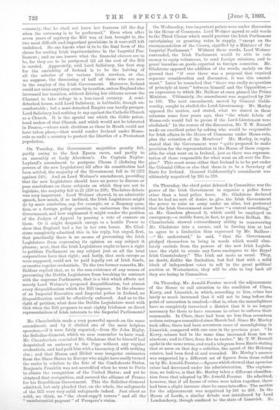On Wednesday, two important points were under discussion in the
House of Commons. Lord Wolmer moved to add words to the Third Clause which would prevent the Irish Parliament entertaining or granting votes in supply, "except on the recommendation of the Crown, signified by a Minister of the Imperial Parliament." Without these words, Lord Wolmer contended, the Irish Parliament would be able to vote money to equip volunteers, to send foreign missions, and to grant bounties on goods exported to foreign countries. Mr. Gladstone opposed the addition of the words, mainly on the ground that "if ever there was a proposal that required separate consideration and discussion, it was this amend- ment." Later he remarked that "there was really no question of principle at issue" between himself and the Opposition,— an expression to which Mr. Balfour at once pinned the Prime Minister. Ultimately, the amendment was negatived by 240 to 188. The next amendment, moved by General Golds- worthy, sought to abolish the Lord-Lieutenancy. Mr. Morley opposed the motion, and stated, what we stated in these columns some four years ago, that "the whole fabric of Home-rule would fall to pieces if the Lord-Lieutenant were abolished." In the course of the discussion, Mr. T. W. Russell made an excellent point by asking who would be responsible for Irish affairs in the House of Commons under Home-rule, plus the retention of the Members? Mr. Morley, in reply, stated that the Government were "quite prepared to make provision for the representation in the House of those respon- sible for what went on in Ireland, just as there was represen- tation of those responsible for what went on all over the Em- pire." This must mean either that Ireland is to be put under the Colonial Office or else that there is to be a Secretary of State for Ireland. General Goldsworthy's amendment was ultimately negatived by 265 to 219.






































 Previous page
Previous page